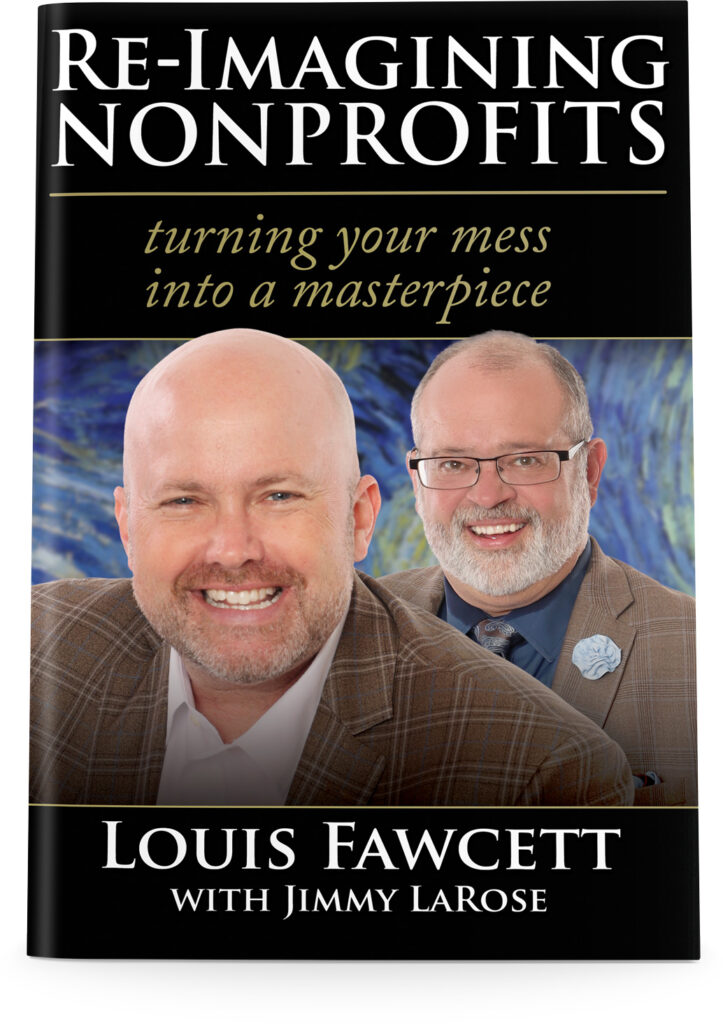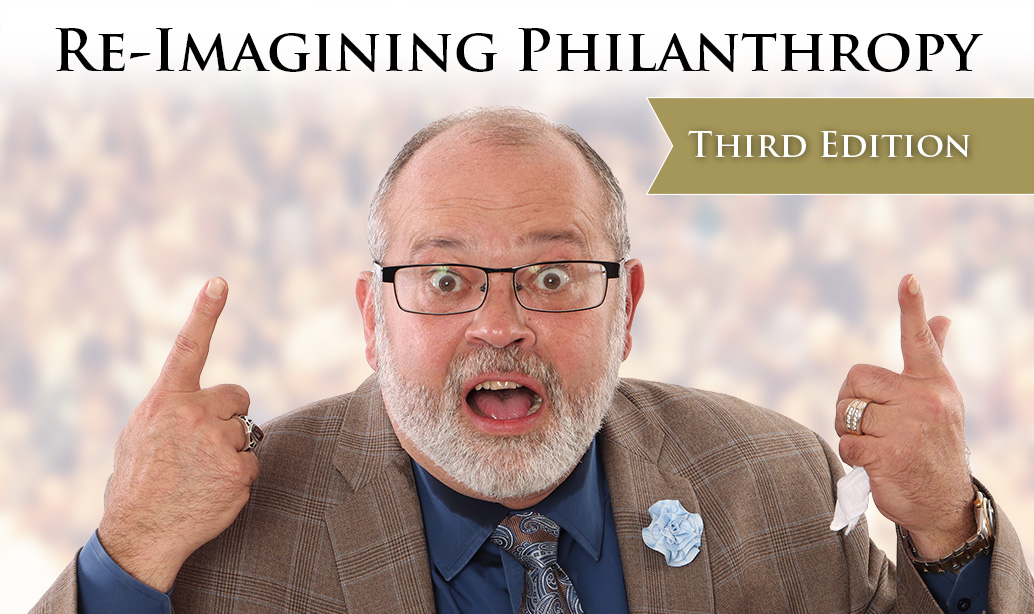
Linda Lysakowski’s – Reimagining Philanthropy and Religion
March 7, 2024Louis Fawcett’s RE-IMAGINING NONPROFITS – Charity Must Change
Louis Fawcett’s RE-IMAGINING NONPROFITS – Charity Must Change is my personal take on the most important book written for charitable organizations in decades. If you are wondering why your nonprofit struggles to keep staff, raise money, and serve all the people who need your services, you will want to pick up Louis Fawcett’s book, RE-IMAGINING NONPROFITS. This book is a must read for CEOs and board members.
 Warning: You will be shocked, and maybe even angry at some of Louis’s advice, but if you aren’t bold and daring, you probably shouldn’t be in the nonprofit world in the first place, so before you throw away the book after seeing some of his chapter titles—Getting the Board Out of the Way, Founder’s Syndrome, The Mess: Why Nonprofits Are Broken–read on. By the end of the book, you will be saying, “Hey, this guy really does know something that can help my nonprofit.”
Warning: You will be shocked, and maybe even angry at some of Louis’s advice, but if you aren’t bold and daring, you probably shouldn’t be in the nonprofit world in the first place, so before you throw away the book after seeing some of his chapter titles—Getting the Board Out of the Way, Founder’s Syndrome, The Mess: Why Nonprofits Are Broken–read on. By the end of the book, you will be saying, “Hey, this guy really does know something that can help my nonprofit.”
Louis has been around nonprofits for a long time, as I have, and he sees the need to change from the 1990s model to one more appropriate for our times. As President of National Association of Nonprofit Organizations & Executives he tells us that without serious changes in the nonprofit sector, we will continue facing a 45 percent donor retention rate—which means we are losing more than half or donors—or maybe see an even bigger decline in donor retention.
“Warning: You will be shocked, and maybe even angry at some of Louis’s advice!”
So, what are some of the things that must change? I’ll start with the one obvious thing that probably every nonprofit CEO has heard since they’ve been in the nonprofit sector—your board has to raise money, so even though they are your bosses, you have to tell them they have to “Give, Get, or Get Off.” There are several things wrong with this concept—first, the CEO feels like a toddler begging for one more cookie. Second, most board members hate fundraising and are recruited without any realistic expectation of what their role is when told they must raise money. Ultimately, they resign or just refuse to do something that hadn’t bargained for. Finally, nonprofit leaders are not taking advantage of the real skills for which their board members should be recruited.
Louis is angry about the malfunction of the nonprofit system, and you should be too! People who need your help are not getting it because you lack the resources, both human and financial, to serve all the people that need your help. All nonprofits are in the business of changing lives, saving lives, or sometimes both. Are you able to do this effectively? If not, Louis suggests you take a look at several things: staffing—do you have the money to pay staff what they are worth? (They should be paid competitive wages, including the CEO). This is not a hobby or something you can do in your spare time, or with volunteers. Let’s have our staff work reasonable hours for a decent salary.
“Most board members hate fundraising and are recruited without any
realistic expectation of what their role regarding the raising of money.”
Second: Have a strong CEO! Notice we didn’t say Executive Director, the common title given to most nonprofit leaders. You are running a business, and you need a person who can understand best business practices and implement them in the nonprofit sector. Which leads to another thing Louis discusses effectively—Founder’s Syndrome. Many nonprofits were started by a well-intentioned person who had a great vision, but no plan to attain that vision. And all too often, this person thinks of their nonprofit as their “baby,” and won’t let go. What happens when a parent does not let their child grow up and leave home? Disaster. And that’s what faces the nonprofit who has a founder who won’t let go.
Louis Fawcett’s RE-IMAGINING NONPROFITS – Charity Must Change
Another area that probably shocked and maybe really ticked you off, is Louis’ discussion of Community Foundations and Donor Advised Funds. Although I must admit that donor advised funds are often run by a for profit business and we might expect them to be profit-drive—for themselves; however, community foundations are nonprofits and yet, I have seen some that are profit-oriented for themselves. “Let us manage your endowment fund, for a small fee.” I have seen some community foundations that never give grants to the nonprofits in their community—the purpose of a true foundation. But they seem to be more motivated by how much money their foundation can store up for themselves, not how they can support their community organization.
VISIT HERE TO PURCHASE YOUR COPY OF LOUIS FAWCETT’S RE-IMAGINING NONPROFITS
Louis also makes another statement that might shock you—that gifts to your nonprofit are investments, not donations. But wait, aren’t people altruistic, don’t they give for reasons that are purely philanthropic without expecting anything in return? But they do expect something in return—that your organization is well managed and run effectively and efficiently, that you really are changing and/or saving lives, that you are making your community a better place to live and work, and perhaps operate a business. So, they are looking for a good investment, not necessarily for a financial return but for a return of seeing people helped, of saving our earth, of saving human and/or animal lives, whatever your mission is. That is the return on investment they are seeking. So, can you offer a return on your donors’ investments?
philanthropic without expecting anything in return? But they do expect something in return—that your organization is well managed and run effectively and efficiently, that you really are changing and/or saving lives, that you are making your community a better place to live and work, and perhaps operate a business. So, they are looking for a good investment, not necessarily for a financial return but for a return of seeing people helped, of saving our earth, of saving human and/or animal lives, whatever your mission is. That is the return on investment they are seeking. So, can you offer a return on your donors’ investments?
Well, by now, you’re probably angry at Louis and at me. How dare we say the nonprofit sector is a mess? Well, we both want to help you clean up that mess, Imagin how exciting it would be if every nonprofit admitted that we were failing at our job and resolved to turn that around and mop us that mess we as a sector have made!
Well, if you’re ready to be among the first, Louis’ book offers some practical ways we can start to turn the world around. Among his words of wisdom are:
- Treat your donors like customers—would you go into Starbucks if you had to wait an hour in line because they weren’t paying competitive wages to retain their employees, or they were promising you coffee but instead gave you warm dishwater?
- Know you Numbers—how much do your programs cost, how much are you really netting on that special event that grossed $500,000?
- Have a strong CEO—did Tesla and Amazon become as big as they are by having a well-intentioned CEO that didn’t know how to run a company?
- Get your board out of the way—how do big corporations treat board members—as advisors and someone who holds the CEO accountable, not as a group that runs the business!
We would love to hear from you about what you are going to do to clean up the mess.
Louis Fawcett’s RE-IMAGINING NONPROFITS – Charity Must Change was first posted at LindaLysakowski.com
For more articles like Louis Fawcett’s RE-IMAGINING NONPROFITS – Charity Must Change VISIT HERE
VISIT HERE TO PURCHASE YOUR COPY OF LOUIS FAWCETT’S RE-IMAGINING NONPROFITS
About The Author:
Louis Fawcett is the President of National Association of Nonprofit Organizations & Executives. He is a Major Gifts Ramp-Up expert and serves as a Senior Counselor with Development Systems International.



